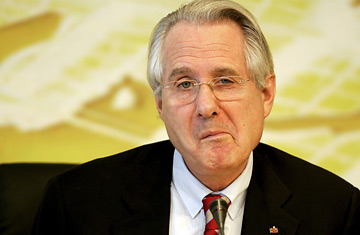
Klaus Zumwinkel, CEO of Deutsche Post AG
It began last week with the arrest of a leading German executive on suspicion of tax evasion. Now Germany is enthralled by a tale of unbridled greed that offers as much drama as any Hollywood thriller could — but with possibly far greater political consequences. Prosecutors have said that further probes are under way into the tax affairs of hundreds of individuals suspected of funneling millions of euros into anonymous bank accounts in Liechtenstein under the radar of German tax authorities. The targets are thought to include some of Germany's wealthiest and most prominent citizens.
The probe began almost by accident. During an investigation into organized crime, agents of Germany's Federal Intelligence Service, the BND, became acquainted with an employee of a bank in Liechtenstein, a tiny principality between Austria and Switzerland with very secretive banking laws. The agents turned their contact over to German tax authorities. With the approval of the German government, tax investigators paid the contact more than $7 million (5 million euros) and provided him with a new identity in exchange for a CD detailing the Liechtenstein bank accounts of hundreds of German citizens.
The first suspect ensnared by the German taxman was Klaus Zumwinkel, the CEO of Deutsche Post WorldNet, the former German postal monopoly, which now owns DHL and has become a global logistics giant. He is suspected of evading taxes totaling some $1.47 million (1 million euros) by transferring funds to a bank in Liechtenstein. Police detained Zumwinkel for questioning last week and carted trunkloads of documents from his home and office. Under intense political pressure, Zumwinkel resigned from his job at Deutsche Post, which is still partially state-owned. Zumwinkel was released after questioning, and the investigation continues.
On Monday, more than three dozen prosecuting attorneys and several hundred police swarmed out to search offices and private homes of other suspected tax evaders in Frankfurt, Munich, Stuttgart, Ulm and Hamburg. And prosecutors said their work was just beginning.
For the coalition government led by center-right Chancellor Angela Merkel, the scandal could hardly have come at a worse time. Germany is already engaged in a deepening ideological battle over the bloated salaries of its top corporate executives. Socialists are calling for a statutory minimum wage, a move most conservatives oppose, as well as for a law to limit executive salaries. Many voters are angry that ordinary workers have to carry the burden of Germany's economic reforms while executives give themselves huge pay increases, and they have been flocking to an opposition party called the Left, an amalgam of the former East Germany's ruling communist party and West German leftists. Though long established in the East, the Left managed in January to enter state legislatures in the large western states of Hesse and Lower Saxony.
No one expects a communist uprising, of course: The Left is still a negligible presence in most of Germany. But as the police swarmed out on Monday, it was becoming clear that society's wrath would be swifter and harsher than usual for Germans deemed greedy enough to shirk taxes. Even Merkel, generally reluctant to rush to judgment, seemed stunned by the breadth of the scandal. "I think a lot of people in Germany feel the way I do: that this goes well beyond what I ever imagined could be possible," Merkel told reporters.
The tone was even harsher from Merkel's aides and leaders of the other political parties, many of whom called for stiff jail sentences for those convicted of tax evasion. "It would be unbearable if, in the end, deals were made instead of putting people on trial," said Kurt Beck, chairman of the Social Democrats, junior partner in the federal government coalition.
Merkel's political challenge now is to prevent the widespread anger over the tax evasion scandal from becoming a broader political crisis. In Germany, it's not necessarily enough to just throw a few corporate executives in jail and be done with it. A poll conducted earlier this month by Infratest Dimap found that 69% of Germans feel wealth in the country is unjustly distributed. And that sense could have political ramifications: polls show declining support for Germany's social market economic system. The Left has surpassed the Greens and the Free Democrats to become, with the allegiance of 11% of the electorate, the country's third largest political party.
Fearing that public trust in the economic system could erode more quickly, some business leaders are beginning to sound the alarm. In an interview in Monday's edition of the tabloid Bild, Josef Ackermann, the CEO of Deutsche Bank, joined the chorus of voices warning against a loss of public faith in the country's economic institutions. "All of us in business must now make a renewed effort to live up to the responsibilities of our leadership roles and win back lost confidence," he was quoted as saying.
Meanwhile, investigators are expected to continue their search for suspects. Merkel, due to meet Liechtenstein's Prime Minister Otmar Hasler in Berlin on Wednesday, is pressing to close any loopholes that encourage tax evasion. Whatever the outcome of that effort, it appears likely that in Germany's tax scandal, the drama has just begun.
